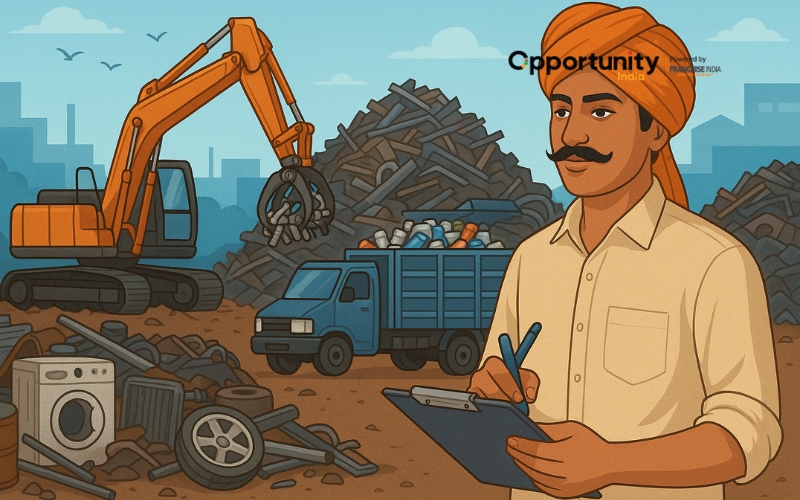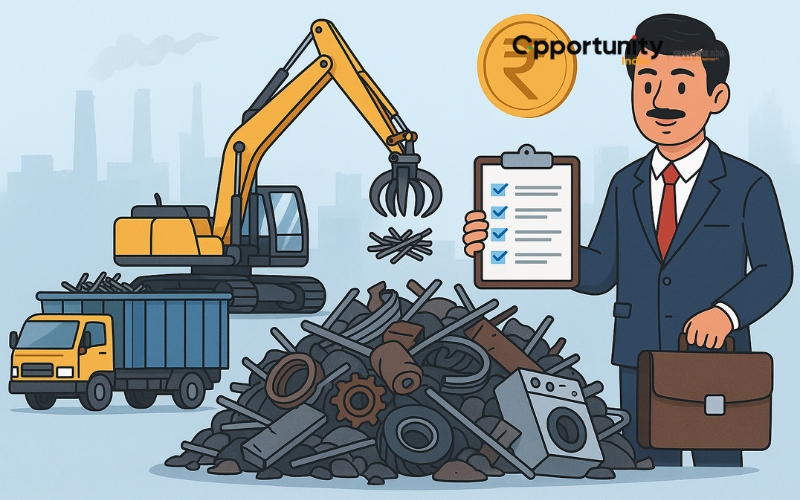
Has it ever occurred to you that "someone should be making money from this" when you saw all the trash piled up in your neighborhood? Well, this someone could be you. Yes, you heard that right, you can make a scrap business out of trash and make money. India's scrap business is where opportunities are waiting for you on the streets, and rubbish is turned into profit. Starting a scrap business is not only wise but also appropriate in 2025, as India strives for greener cities, sustainable development, and smart recycling.
Understanding the scrap business in India
The recycling industry for non-ferrous scrap in India brought in USD 3.0 billion in 2023 and is projected to grow to USD 4.8 billion by 2030. A compound annual growth rate (CAGR) of 6.8% is anticipated for the Indian market between 2024 and 2030. Lead was the segment that generated the most money in 2023. India is more focused than ever on waste management, the circular economy, and sustainability in 2025.
Also Read: Petrol Pump Business Plan in India: The Ultimate Guide
The nation produces millions of tons of scrap material every year, including metal, plastic, paper, e-waste, and more, as a result of growing urbanization, industrialization, and consumerism. Aspiring business owners now have a fantastic chance to start a scrap business in India, which has strong long-term growth potential and requires little investment.
To put it simply, a scrap business involves gathering, classifying, and selling waste materials such as electronics, paper, plastic, metal, and more. However, it's a full-fledged business that handles customer service, recycling, storage, and logistics in addition to trash collection. India's economy is expanding, and as it does, so is consumption and waste. However, smart businesspeople perceive what some consider rubbish as a treasure. Far from being a primitive industry, India's trash industry is developing into an essential part of the circular economy with substantial financial and environmental benefits.

Why Start a Scrap Business in 2025?
The scrap market is full of opportunities if you want to launch a business in 2025 that will have a noticeable impact and yield attractive results. Here’s why you should consider starting this business:
- Government Drive for Sustainability: Programs such as the "Waste to Wealth Mission," the Production Linked Incentive (PLI) program for essential minerals, and the emphasis on a circular economy are fostering an atmosphere that is favorable to recycling enterprises.
- Growing Industrial and Urban Waste: As a result of rapid urbanization, industrialization, and an expanding customer base, junk of all kinds, including paper, plastic, metal, and e-waste, is continuously being produced.
- High Demand for Recycled Materials: In an effort to cut expenses and fulfill environmental goals, manufacturers from a variety of industries are increasingly depending on recycled raw materials.
- Vehicle Scrapping Policy: The market for scrapped vehicles is predicted to grow by 44.5% in 2025 due to the Voluntary Vehicle Fleet Modernization Programme, which was introduced in 2021, and proposed tax breaks for new car purchases made after existing vehicles are scrapped.
What Kind of Scrap Business Can You Deal In?
Before you begin your journey into the scrap business field and invest your money, it is important to know what you want to deal with.
Metal Scrap
This is among the most profitable categories. Iron, copper, aluminum, brass, and steel can be gathered from industries, obsolete appliances, and construction sites. Since metal scrap has a high market value, foundries and recycling facilities are constantly looking for it.
Plastic Scrap
Plastic trash can be found everywhere, from PET bottles and packaging materials to domestic plastic waste. It is simple to gather and sell to recyclers, who turn it into pellets that may be used again in manufacturing.
Also Read: Future of Ayurvedic Healthcare Franchises in India
Paper scrap
This category includes periodicals, books, old newspapers, office paper, and cardboard boxes. Paper mills always need paper waste to recycle into new sheets since it is lightweight and convenient to store.
Electronic Waste
E-waste is a jackpot if you're seeking huge profits. Valuable metals can be found in discarded devices such as computers, printers, wires, and cell phones. The profit margins are enormous, but you'll need the right licensing.
Vehicle Scrap
The market for scrapping old cars is expanding as a result of India's scrappage legislation. You can deal in metal frames, batteries, tires, and other parts for vehicles, motorcycles, and trucks. This is a profitable choice due to the parts' resale value.

Step-by-Step Guide to Start a Scrap Business in India
Market Research and Choose Your Niche
- Recognize your local market before you start collecting any scrap.
- What kinds of scrap are most in demand in your region? Decide which scrap kind you want to target.
- Assess nearest recycling facilities, rates per kg/ton, and local demand.
- Make connections with rubbish collection workers, scrapyards, and kabadiwalas.
Decide Your Business Model
You can begin with either:
- The Collection & Aggregation Model involves gathering scrap from homes, businesses, and retail establishments, sorting it, and selling it to major recyclers.
- Scrap Yard: Establish a scrap yard where vendors and purchasers can come straight to one another.
- Processing Unit: Purchase equipment to crush, melt, or clean scrap for future sale (e.g., melting metal or shredding plastic).
Select an Appropriate Site
Your collecting location or junk yard ought to be:
- Outside or in industrial areas (because of the dust and noise).
- Trucks or mini-tempos can reach it.
- Have a suitable storage area with limits and sheds.
Also Read: Is it Profitable to Start a Music School Franchise in India in 2025?
Register Your Business
- Business Entity: Register as a Pvt. Ltd., partnership, or sole proprietorship.
- GST Registration: It is required to purchase or sell scrap legally.
- Pollution NOC: Required from the State Pollution Control Board.
- Trade License: From the municipal government in your area.
- E-Waste Authorization: To handle electronic garbage (from CPCB/SPCB), authorization is required.
- Registering with Udyam: To receive MSME benefits.
Procure Tools & Equipment
Your scale will determine what you need:
- Basic Equipment: Trolley, bins, gloves, cutters, and weighing scale.
- Transportation: Used a tempo, pick-up van, or was tied up with a third party.
- Advanced Equipment (for larger units): Shredders, balers, compactors, plastic granulators, etc.
Investment Breakdown (2025 Estimate)
| Expense Category | Estimated Cost (₹) |
|---|---|
| Business Registration & Licenses | ₹25,000 - ₹50,000 |
| Land/Space Lease (500–1000 sq. ft) | ₹15,000 – ₹40,000/month |
| Basic Tools & Setup | ₹50,000 – ₹1,00,000 |
| Labor (2–3 people) | ₹30,000 – ₹45,000/month |
| Transportation (Used Tempo or Rental) | ₹1,00,000 – ₹3,00,000 |
| Initial Scrap Procurement | ₹50,000 – ₹2,00,000 |
| Machinery (optional) | ₹2,00,000 – ₹10,00,000 |
| Miscellaneous (branding, admin, electricity) | ₹20,000 – ₹50,000 |
Minimum Investment Needed: ₹2 – ₹5 Lakhs (Small Scale)
Medium Scale with Machinery: ₹8 – ₹15 Lakhs
Challenges and How to Overcome Them
- Unreliable Supply: Establish solid, dependable connections with several providers. Provide prompt pickups and reasonable pricing.
- Price Fluctuations: Pay close attention to market developments. Reduce hazards by dealing with a variety of scrap types.
- Regulatory Obstacles: Maintain complete compliance by keeping up with all government regulations. For licensing, get expert advice.
- Logistical Concerns: Make investments in effective storage and transportation. Improve the routes used for collection.
- Competition: Set the business apart with clear pricing, excellent customer service, and possibly specialty products (such as recycling e-waste).
- Quality Control: To optimize scrap value, teach your employees the correct sorting and cleaning methods.
Starting a scrap business in India in 2025 is a wise and secure business move. It combines environmental effects with revenue. You can create a scalable and sustainable business with a small investment, good sourcing, and an emphasis on compliance and hygiene. You don't need a lot of money or a fancy degree. A sharp eye, networking abilities, and a willingness to get your hands dirty are what you need. Recycling and garbage management are expanding sectors in 2025, and if you play your cards well, your scrap business may be both successful and meaningful.

